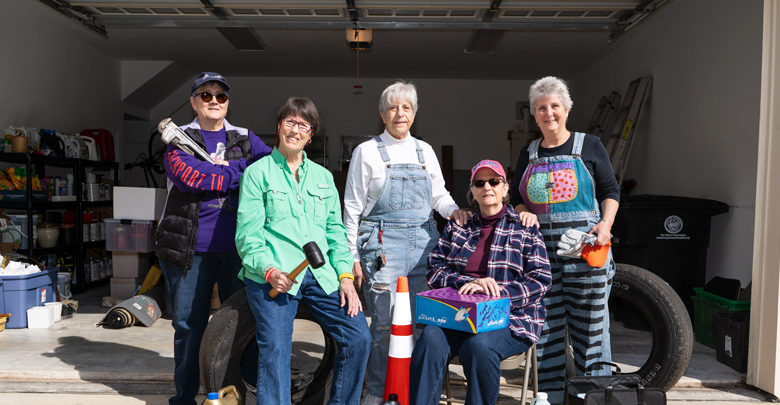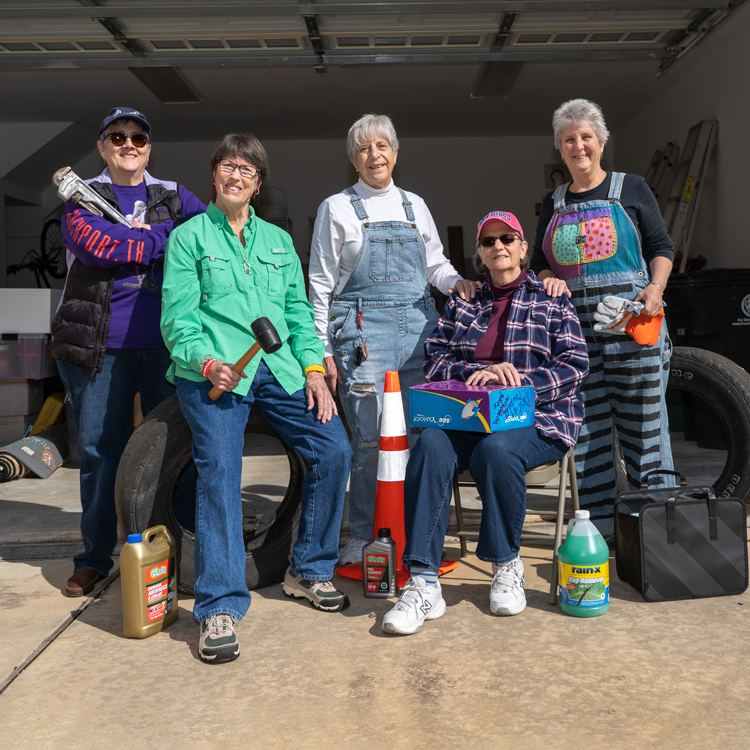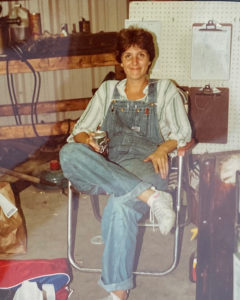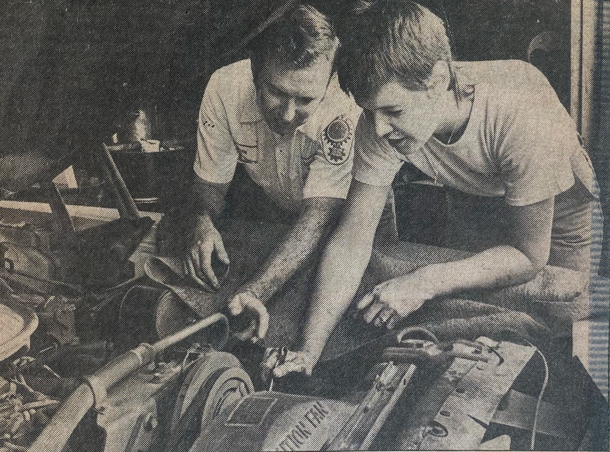
The Wheel Deal
Tori Williams recalls Houston’s first auto-repair garage run by women, for women.

From 1982 to 1984, seven Montrose-area women took part in a very special business project. Their goal was to jointly own a car-repair business that would be run by women, for women. Although the venture has long since disbanded, each of the seven owners still has happy memories of their effort and everything that they learned in the process.
Bringing an Idea to Reality
Tori Williams is the woman who had the original inspiration for the business. After graduating with a degree in social work from the University of Wisconsin, she moved to Houston to take a position with Lutheran Refugee Services.
Early in 1982, Williams was talking with a woman in the automotive field whom she had met at a party. The woman said that more women should be training to become auto mechanics. The wages for mechanics are good, and women have the advantage of smaller hands and arms that can allow them to more easily work on car engines.

The idea struck Williams, and she thought she would like to be a part of helping train women to become mechanics. After mulling over the idea and talking with friends about it, she received enough encouragement to pursue her dream.
Williams then came up with a list of the skills that would be needed for the business venture. She matched the required skills to friends who were all part of a Monday-night basketball group that played in Cherryhurst Park.
The group included Sandy Scurria, a doctor; Sandy Morse, a policewoman; Claire Baker, a health department inspector; Rene Braud, a pollution-control officer; Pat Corrigan, a printing company assistant manager; and Pokey Anderson, a paralegal.
Williams had inherited $5,000 from a close friend who had died, and she felt the auto-repair garage would be a good investment. She also asked her six friends to join her by investing $1,000 each. This gave the group $12,000 to start the garage.
Williams doesn’t remember where the name “Moving Right Along Garage” came from, but a good guess is that it was taken from Johnny Carson’s catchphrase at the end of his Tonight Show opening monologue, when he would make a golf swing and say, “Moving right along. . . ”
Their rented garage, with an office and two service bays, was located at 4830 Pinemont, near TC Jester. Owner Allen Gebhart’s auto-repair business was closed on weekends, so he offered to let the women use his building and his tools on Saturdays. He asked only for a percentage of their business income.
The garage was incorporated, and the first meeting of the board was held on March 24, 1983. Williams used her voicemail to take calls for the garage, and advertisements were placed in numerous local women-oriented publications.
The investors did not intend to be the mechanics, so they spread the word that they were hiring female mechanics by offering $50 to anyone who could locate a female mechanic. Finally, five women were found.

An Eventful Opening Day
With everything in place, the shop’s opening day was set for Saturday, May 21, 1983. The night before, there was a huge tropical storm that blew through the city—the worst storm since Hurricane Carla in 1961. Destruction was in the millions, and 11 people died.
Even though streets were difficult to navigate because of flooding and other storm damage, the garage opened on time at 8 a.m. that morning, and had a good response from prospective customers. However, when their new cashier stepped into the front office, she saw a large snake and screamed. The snake disappeared into the floodwaters and was never seen again.
The garage continued to operate every weekend, and its customer base grew. Williams says that the hours were 8 a.m. to 5 p.m., but many Saturdays the crew worked late into the evening.
Each of the investors helped the effort with their skills—bookkeeping, incorporation issues, finance, security, working the cash register, and public relations. Williams was the parts runner and worked as a floater, helping her mechanics with any issues that needed attention. She also brought in food for lunch or dinner.
In September 1983, the garage offered three half-day classes—“A Guided Tour Under the Hood of Your Car,” “Repacking CV Joints in a Front-Wheel-Drive Car,” and “Basic Care for Your Car.” A brochure advertising the classes used the headline “What your mother never told you about your car.”
By the end of 1983, the garage was well-known enough to attract the attention of Houston Post reporter Juan Palomo. On December 18, 1983, the Post published his feature article about the garage.
What Was Learned
In general, the garage ran smoothly in spite of a few “teachable moments.” The first customer who had a spark-plug change was billed for just one spark plug, since the cashier didn’t realize there’s more than one under the hood.

On another occasion, two mechanics were working on an oil change, and somehow each one thought that the other had put the oil cap back on. Of course, the customer soon called back with an overheated engine.
One other women’s car-repair garage was located in the U.S. at the time, and they shared some of their problems with Williams. For example, men are used to dropping off their car with a mechanic and simply picking it up at the end of the day. But female customers want to learn more about how cars are fixed, so they often come out into the bays to ask questions—and thus add to the time required to fix their cars.
Williams’ group found the same thing happening here. “We were trying to help women understand, but it took more of the mechanic’s time and became a difficulty.”
Another issue the garage had to deal with was the poor condition of some of the cars that were brought in for repairs. There were a lot of lower-income female customers, and their cars were often on the verge of falling apart.
In May 1984, William’s father died unexpectedly, and she moved back home to care for her mother, who was dealing with a severe health challenge. Williams was the glue that held the business together, so after her departure the investors decided to close the garage.
Williams says that if she had stayed, the group would probably have moved from car repairs into educational classes. A school would have far less liability, and more income from fees. It was getting difficult for an auto-repair garage to stay solvent.
Corrigan says it was worth every penny the women invested because everyone learned a great deal about business, and it was cheaper than going to business school. The women are all still good friends.
This article appears in the March 2020 edition of OutSmart magazine.










